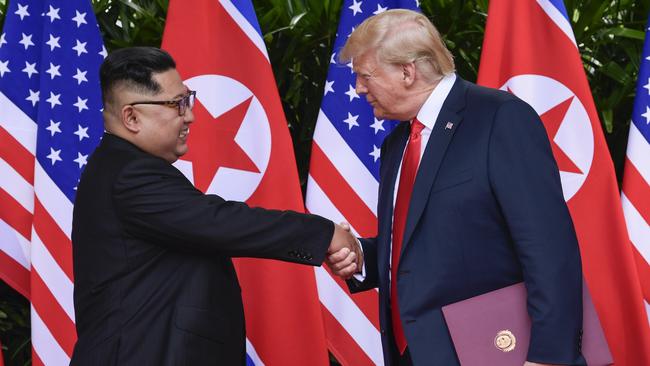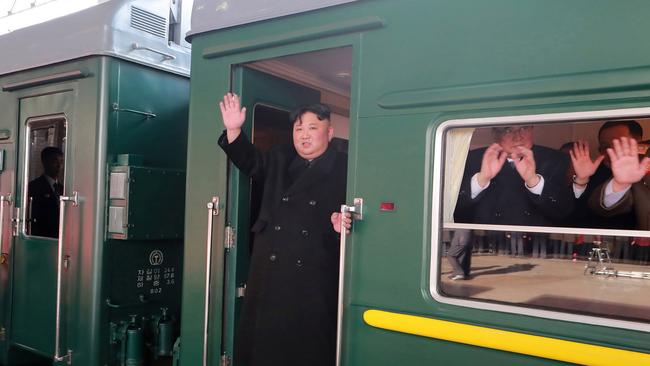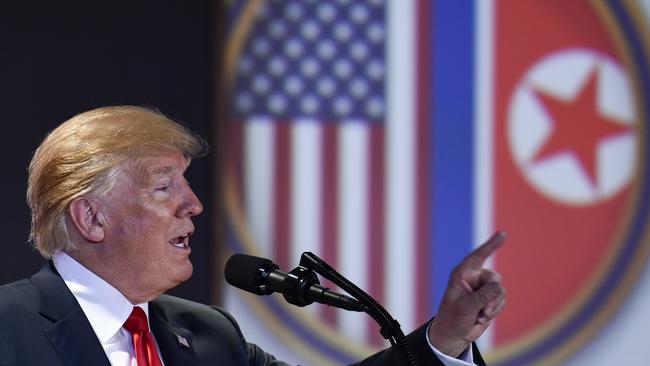Second Trump-Kim show is a long way from Singapore
Ahead of meeting portly Stalinist Kim Jong-un, Donald Trump isn’t getting enough credit for his least recognised but signature skill.

Donald Trump doesn’t get enough credit for one of his least recognised but signature skills — his ability to manage expectations down.
He has been doing just that assiduously and effectively in the lead-up to his second summit with North Korean dictator Kim Jong-un, to be held in Vietnam on Wednesday and Thursday. In his entirely successful recent State of the Union address, Trump didn’t emphasise North Korea but naturally claimed credit for, in his view, fixing the problem.
However, in a radical move intentionally disguised by Trump’s uncharacteristically unemotional language, he changed the goal of his summitry with the portly young Stalinist. It was no longer denuclearisation but, rather, maintaining a stable status quo and an ongoing dialogue.
Contrast that with the effusive, categorical assurances Trump gave after his Singapore summit with Kim last June that North Korea had immediately and irrevocably embarked on the path of denuclearisation.
There is not a professional nor indeed even a well-informed amateur analyst of the Korean peninsula anywhere who believes Kim has embarked on denuclearisation.
The Australian intelligence and analysis agencies have long believed the Kim dynasty cannot even embrace serious economic reform along the lines of China, or indeed Vietnam. Once they do that, our agencies have long believed, the Kims begin the end time of their rule.
That rule is so narrowly based on an almost metaphysical interpretation of the role of the Kim family, they have exacted such horrific economic sacrifice from their population, if they admit that there is a liberalising way to much greater prosperity, so this analysis goes, they open themselves up to a devastating reaction from their population.

During the past few decades there have been countless false dawns of North Korean economic reform — joint development zones in the north, special economic areas on the border where South Korean firms can operate, isolated tourism operations.
They run for a little while and then the North Koreans shut them down, often in the process taking some hostages.
So it seems overwhelmingly likely that Kim will keep his nukes and resist internal economic change that could bring social change.
The men Trump appointed to run the US intelligence agencies said all this in congressional testimony recently. They very specifically said that not only was there no evidence at all that Kim planned to denuclearise, but that in fact he was working to extend some of his nuclear facilities.
Because of these and other judgments he didn’t like, Trump denounced them all, not only the intelligence agencies but the men he appointed to run them.
But Trump is certainly not a fat-head, even though he says such strange things. For, having denounced the intel chiefs, it also seems Trump absorbed the burden of their analysis.
This week Trump has been further hosing down expectations, specifically denuclearisation expectations, of his forthcoming summit with Kim.
He said in Washington that so long as Kim didn’t conduct any more missile or nuclear tests, he was in no hurry about denuclearisation: “I have no pressing time schedule.”
That is an almost complete reverse of everything Trump said just after the Singapore summit, including that North Korea was irreversibly committed to denuclearisation and it would occur speedily.
This week, in characterising the Singapore meeting, Trump said: “We had a tremendous first summit — it was really breaking the ice. But a lot of things came from that, including good relationships.”
Washington has been leaking things that might happen as a result of the Vietnam summit. The US and North Korea might establish liaison offices, a big step towards embassies.
Trump hinted that he may do something substantial for Kim, provided Kim does something substantial for him. Yet the State Department reiterated the old line that the US would not lift any economic sanctions on North Korea until North Korea had fully denuclearised.
It’s worth pausing to compare Kim with Venezuelan dictator Nicolas Maduro, a horrible piece of work. Following the example of his predecessor, Hugo Chavez, he has debauched democracy and reduced Venezuela to miserable poverty. But he is as nothing compared with the savage barbarism of Kim.

Anyone who doubts this should read Michael Kirby’s report on human rights in North Korea, or read one of the memoirs by a North Korean defector. A few years ago, Labor politician Michael Danby organised an international conference in Melbourne on human rights in North Korea. He brought out some of the most renowned North Korean labour camp survivors. Truly, their testimony was like nothing else on the planet, except perhaps Islamic State.
In any event, Kim Jong-un makes Maduro look like Franklin Delano Roosevelt. Yet through the week Trump was denouncing Maduro’s human rights abuses in the most moralistic tones and speaking with full Wilsonian floweriness about the importance of freedom and democracy in Venezuela, while he speaks of Kim as a leader loved by his people, and says of his meeting with Kim, “we fell in love”.
Of course, no one should look for verbal consistency. Much that Trump does on national security is very good. He rightly calls Beijing out for trade abuses and intellectual property theft, and also rightly calls Iran out for its regional aggression.
But then he says and does other things, such as the way he talks about Kim, which are either deranged or simply dishonest, more likely the latter.
Ross Douthat of The New York Times, by far the cleverest columnist writing in that newspaper, offered an explanation of a kind of semi-coherent Trump doctrine: underneath all the political pyrotechnics, Trump is evolving as a more or less recognisable conventional pre-neo-conservative Republican, especially of the kind found in the Cold War.
Under the disciplines of the Cold War and the inheritance of the Monroe Doctrine, it was perfectly normal for Republican presidents to talk in flowery terms about democracy in Latin America, while at the same time making hard-headed accommodations with minor dictatorships a long way away.
In Douthat’s view, Trump has not implemented isolationist policies but, rather, has tried to reduce the number and scale of US distant commitments, while preserving American power and pre-eminence, and focusing strategic competition on the main competitor, in this case China, and to a lesser extent on a couple of regional enemies, especially Iran.
Douthat includes the caveat that all this could be blown away at any minute by Trump’s mercurial personality. Yet Trump may be somewhat less mercurial than he seems. In his two years in office, for example, Trump has actually been extremely cautious about the actual use of force.
Another way of expressing Douthat’s insights is just that Trump often uses the most extremely unconventional behaviour to secure what are in the end pretty conventional policy outcomes.
I have been writing about North Korea fairly consistently for at least 3½ decades. In that time the savagery of the Kim family has not changed very much and nor has its repertoire of international moves either expanded or diminished.
A singular pattern keeps reasserting itself.
That pattern is this: North Korea clandestinely and illegally works to produce nuclear weapons. From time to time it undertakes provocative, even shocking actions, whether nuclear tests, missile tests, international assassinations, sometimes direct but limited military attacks against South Korean forces, and quite often extreme threats and abuse of neighbours.
At some point the US decides Pyongyang has gone too far and threatens the use of force. Barack Obama, whom Trump rightly abuses for being such an ineffective wimp, nonetheless declared to North Korea: “We will not hesitate to use our military might to defend our allies and our way of life.” Kim Jong-un at the time was warning his soldiers to “prepare for imminent war with the US”.
Bill Clinton was on the brink of ordering a military strike on North Korea when Jimmy Carter made this impossible by going to Pyongyang on a freelance peace mission.
In any event, the next step in the regular North Korean dance is that after the Americans threaten Pyongyang, there is an intense sense of crisis in the international system. The crisis ends with a diplomatic truce that involves North Korea effectively being rewarded for stopping whatever outrageous behaviour led to the crisis in the first place.
Meanwhile, North Korea pockets all the gains that its tests, assassinations, aggression, international monetary theft or whatever have given it.
This traditional pattern of provocation, crisis and reward for Pyongyang has been perfectly repeated by Trump.
Thus Kim began the latest round by a series of highly provocative nuclear tests and missile firings. Trump aped previous presidents in his threats, though he went further, saying he would rain “fire and fury the like of which the world has never seen” on North Korea. For a brief period, sanctions were tightened on North Korea.
Kim then did what papa and grandpapa had always done — he offered Washington a deal. Trump thought the deal was denuclearisation in exchange for normalisation of relations with North Korea. That’s the way the North Koreans always present the deal to the Americans. But the deal Kim was really offering was normalisation of relations in exchange for not doing any more tests.
Nuclear boffins say Kim has done enough tests to be able to produce more nuclear weapons, but he still cannot reliably load them on to intercontinental ballistic missiles that can hit targets in the US.
So although Kim has got the better of this exchange with Trump, Trump can take some satisfaction from the fact that he stopped Kim being able to threaten US cities with annihilation.
It is worth noting that when Trump says “I have no pressing time schedule” he is surely expressing his own version of Obama’s policy of “strategic patience” and contradicting earlier statements that “the era of strategic patience is over”.
So while Trump has not done any better than any previous US president, in terms of real strategic outcomes, he has not done any worse.
Where do we go from here? I think Trump’s primary goal is just to keep the show going until the next election. So long as there are no more nuclear or missile tests, Trump can continue to claim this diplomacy as a triumph.
Kim now faces a nice dilemma. He has got a great deal from this process. Papa and grandpapa would have loved to get a summit with the US president. Kim sees this as a big step on the road to full international acceptance.
Kim would like US sanctions reduced but he has already got sanctions relief from China and Russia. He wants something more from Trump, but he must be careful not to overplay his hand, not to push Trump back to confrontation.
The greatest potential damage in this whole dynamic is to the US-South Korea military alliance, which is vital for the stability of Asia. But for the moment this, too, seems to be in a stable holding pattern.
Who would have guessed that all of Trump’s drama would produce stability and the status quo, more or less.
The subtext of holding the summit in Vietnam is: look how great economic reform can be for ex-communist nations, and look how nice the US can be to former enemies.
But the heavy hand of China also puts a severe limitation on what can really happen. Still, for theatre, there will be nothing like the Trump-Kim show in the world this week.



